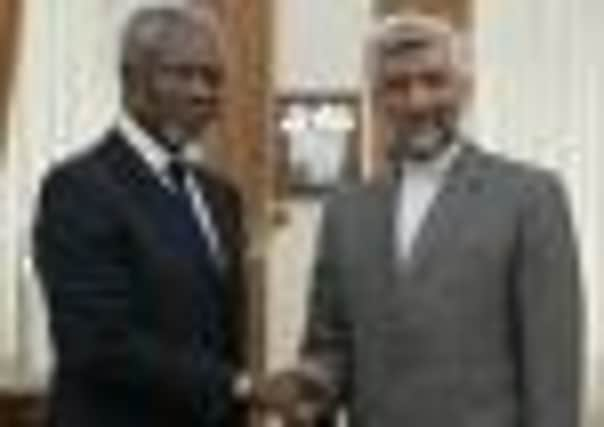Assad backs UN deal focused on flashpoints, claims Annan


At a news conference in Iran yesterday, international envoy Kofi Annan said the plan had yet to be presented to the opposition. But he said Mr Assad suggested trying to calm specific areas a day earlier during talks in Damascus aimed at ending the violence, which activists say has killed more than 17,000 people since March last year.
“[Assad] made a suggestion of building an approach from the ground up in some of the districts where we have extreme violence – to try to contain the violence in those districts and, step by step, build up and end the violence across the country,” Mr Annan told reporters in Iran, his first step on a tour of Syria’s key allies.
Advertisement
Hide AdAdvertisement
Hide AdMr Annan later visited Iraq and met prime minister Nouri al-Maliki to discuss the crisis.
The conflict in Syria has defied every international attempt to bring peace, including an earlier effort by Mr Annan, and there was no sign that the plan the UN-Arab envoy described yesterday will succeed. Mr Assad still has the support of Russia, Iran and China, despite a bloody crackdown which has made him an international pariah.
Mr Annan’s latest efforts to reach out to Syria’s allies suggest he sees them as integral to solving the crisis. His trip to Iran in particular appeared to oppose America’s approach, which has rejected Iran’s participation in helping solve the crisis.
The Iranians have provided Mr Assad with military and political backing for years, and have remained onside since the Syrian uprising began.
US state department spokesman Patrick Ventrell said Washington doubted Iran would play a constructive role.
“If the Iranian regime wants to stop giving direct material support to the Syrian killing machine… we would welcome that. We’re not at that point yet,” he said in Washington.
Critics said Mr Annan’s tour of Syria allies smacked of betrayal.
Rajeh Khoury, a columnist in Lebanon’s An-Nahar newspaper, said Mr Annan’s actions “give the Syrian regime more time to accomplish the impossible task of crushing the uprising.
Advertisement
Hide AdAdvertisement
Hide Ad“His insistence on making Iran part of the solution at a time the opposition sees Iran as part of the problem is extremely dangerous. ”
Yesterday, Mr Annan said Iran has offered its support to end the conflict and should be a “part of the solution.”
“My presence here proves that I believe Iran can play a positive role and should therefore be a part of the solution in the Syrian crisis,” he said after meeting with Iranian foreign minister Ali Akbar Salehi.
He said he has “received encouragement and co-operation” from the Iranian government but did not elaborate.
Since Mr Assad took power following the death of his father, Hafez, in 2000, he has deepened ties with Iran, making it Syria’s strongest regional ally. Tehran, in turn, has boosted his military, providing it with communications technology and weapons, as well as military advisers.
Mr Annan did not say what kind of involvement he saw for Iran in resolving the crisis, nor did Mr Salehi spell out what Tehran was willing to do
Mr Annan brokered a six-point peace plan earlier this year, but it has failed to gain traction on the ground.
Mr Salehi said Tehran backs the rights of the Syrian people but opposes military intervention. He also blamed foreign powers for the worsening violence. “Unfortunately, the unwise interference of others has caused the situation in Syria to remain critical,” he said.